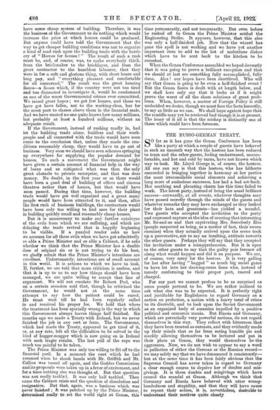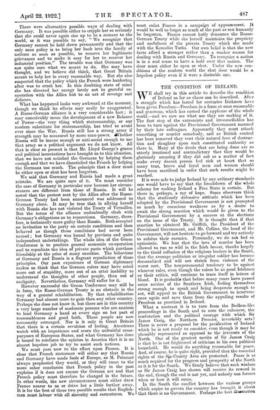THE 11,USSO-GERMAN TREATY.
S' far as it has gone the Genoa Conference has been like a party at which a couple of guests have behaved in such an uncouth way that the hostess has been reduced to tears and the other guests, feeling embarrassed, uncom- fortable, and hot and cold by turns, have not known which way to look. Mr. Lloyd George is, of course, the hostess. All one can say is that this hostess, Who has hitherto succeeded in bringing together in harmony at her parties the most irreconcilable social elements and achieving a long score of audacious successes, has had a bad set-back. Her soothing and placating charm has this time failed to work. The latest party,-instead of being the usual brilliant Success—outwardly, at all events, whatever thoughts may have passed secretly through the minds of the guests and whatever remarks they may have exchanged as they looked for their hats and greatcoats—has yielded a Scandal. Two guests who accepted the invitation to the party and expressed rapture at the idea of meeting that interesting Mr. So-and-so and that captivating. Mrs. Somebody Else (people suspected as being, as a matter of fact, their sworn enemies) when they actually arrived upon the scene took up a provocativeinot to say an insulting, attitude towards the other guests. Perhaps they will say that they accepted the invitation under a misapprehension. But it is open to the other guests to say that the guilty pair foresaw all along what would happen and did it on purpose. We are, of course; very sorry for the hostess. It is very galling for her after having " bagged " so much big social game to have let into her drawing-room lions who, instead of tamely conforming to their proper part, roared and charged.
For our part. we cannot profess to be so surprised as some people pretend to be. We are rather inclined to ask what else was to be expected. It is perfectly right and justifiable for Englishmen to regard Germany as a, nation on probation, a nation with a heavy total of crime to its discredit; and' to look upon the Soviet Government as an organized body of assassins impelled by a positive political and economic mania. But Russia and Germany, which are potentially very powerful nations, do not regard themselves in this way. They reflect with bitterness that they have been treated as outcasts, and they evidently made up their minds that so far from eating humble pie and meekly allowing themselves to be lectured and put in their place at Genoa, they would themselves be the aggressors. Now, we do not wish to appear to say a word in palliation of either the German or the Russian record— we may safely say that we have denounced it consistently— but at the same time it has been fairly obvious that the Supreme Council has never taken in regard to Germany a clear enough course to deprive her of doubts and mis- givings. It is these doubts and misgivings which have caused the scandal at Genoa. Although we think that Germany and Russia have behaved with utter wrong- headedness and stupidity, and that they will have cause to repent their action, it is, nevertheless, desirable to understand their motives' quite clearly There were alternative possible ways of dealing with Germany. It was possible either to cripple her so seriously that she could never again rise up to be a menace to the world, or it was possible to say, " We recognize that Germany cannot be held down permanently and that the only sane policy is to bring her back into the family of nations as soon as possible, to remove her legitimate grievances and to make it easy for her to recover her industrial position." The trouble was that Germany was not quite sure what we meant to do. She may have thought, and we believe did think, that Great Britain meant to help her in every reasonable way. But she also suspected that the policy which the French were hankering after was to crush her. In this doubting state of mind she has directed her energy lately not to grateful co- operation with the Allies but to an act of revenge and defiance.
What has happened looks very awkward at the moment, though we think its effects may easily be exaggerated. A Russo-German affiance is a very considerable fact ; it may conceivably mean the development of a new Balance of Power—the very thing which statesmanship, or our modem substitute for statesmanship, has tried to avoid ever since the War. Russia still has a strong army if strength may be measured by mere man-power. aliether Russia will be insane enough or anti-social enough to use that army as a political argument we do not know. All that is clear at present is that Mr. Lloyd George's graces and political incantations have brought us to this situation, that. we have not satisfied the Germans by helping them enough and that we have dissatisfied the French by helping the Germans too much. The principle that a door must be either open or shut has been forgotten.
We said that Germany and Russia had made a great mistake. We are quite sure of it. We must consider the case of Germany in particular now because her circum- stances are different from those of Russia. It will be noted that the protest sent by the Allies after the Russo- German Treaty had been announced was addressed to Germany alone. It may be true that in allying herself with Russia she has not violated the Treaty of Versailles. But the terms of the affiance undoubtedly clash with -Germany's obligations as to reparations. Germany, there- fore, is technically more guilty than. Russia. Both accepted an invitation to the party on certain conditions and then behaved as though those conditions had never been named ; but Germany was bound by previous and quite independent undertakings. The whole idea of the Genoa Conference is to produce general economic co-operation and to repudiate the idea of private jiacts which purchase friendship at the price of many enmities. The behaviour of Germany and Russia is a flagrant repudiation of these principles. Our past experience of German diplomacy makes us think that the German rulers may have acted more out of stupidity, more out of an utter inability to understand the thoughts of other people, than out of malignity. Nevertheless, Germany will suffer for it. However successful the Genoa Conference may still be in form, the Russo-German Treaty is an obstacle in the way of a general rehabilitation. By that rehabilitation Germany had almost more to gain than any other country. Perhaps she does not know it, but there are in this country a very large number of moderate persons who are anxious to lend Germany a hand at every sign on her part of reasonableness and good faith. These people are now necessarily estranged. Nor is it only in Great Britain that there is a certain revulsion of feeling. Americans watch with an impatience and scorn the unfruitful cross- purposes of European States, and what Germany has done is bound to reinforce the opinion in America that it is an almost hopeless job to try to assist such nations.
We must pass now to the effect upon France. It is clear that French statesmen will either say that Russia and Germany have made fools of Europe, as M. Poincare always prophesied they would, or they will come to the more sober conclusion that French policy in the past explains if it does not excuse the German act and that French policy must therefore be changed in the future. In other words, the new circumstances must either draw France nearer to us or drive her a little further away. It is for the first of these two possible results that English- men must labour with all sincerity and earnestness. We must enlist France in a campaign of appeasement. Ii would be well to forget as much of the past as can humanly be forgotten. France cannot hotly denounce the Russo- German Treaty while she herself maintains the propriety and usefulness of the private Treaty which she made • with the Kemalist Turks. Our own belief is that the new facts afford a stronger rather than a weaker reason for dealing with Russia and Germany. To recognize a nation is in a real sense to have a hold over that nation. The door must either be open or shut. Under the new con- ditions of the modern world the shut door would be a hopeless policy even if it were a desirable one.



































 Previous page
Previous page